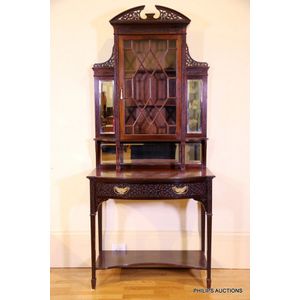Victorian Carved Mahogany Servery with Mirrors and Shelves
You must be a subscriber, and be logged in to view price and dealer details.
Subscribe Now to view actual auction price for this item
When you subscribe, you have the option of setting the currency in which to display prices to $Au, $US, $NZ or Stg.
- Breakfront - A design generally found in larger pieces of furniture, such as bookcases, wardrobes and some sideboards. The line of the front is interrupted by the middle section standing out from each end. In a reverse breakfront, the centre section is recessed behind each end. Breakfronted pieces are usually made in three sections the middle and the two wings which are held together by the cornice and pediment, and the plinth on which it stands. The sensible buyer should show caution before buying breakfront pieces, especially bookcases, which are highly desirable and expensive. Always check that the timber, colour, patination, backboards, decoration and thickness of the wood are same in each section.
- Victorian Period - The Victorian period of furniture and decorative arts design covers the reign of Queen Victoria from 1837 to 1901. There was not one dominant style of furniture in the Victorian period. Designers used and modified many historical styles such as Gothic, Tudor, Elizabethan, English Rococo, Neoclassical and others, although use of some styles, such as English Rococo and Gothic tended to dominate the furniture manufacture of the period.
The Victorian period was preceded by the Regency and William IV periods, and followed by the Edwardian period, named for Edward VII (1841 ? 1910) who was King of the United Kingdom and the British Dominions and Emperor of India for the brief period from 1901 until his death in 1910. - Column - An architectural feature sometimes used for decorative effect and sometimes as part of the supporting construction. Columns should generally taper slightly towards the top. They may be plain or decorated with carving, fluting or reeding. Columns may be fully rounded or, more commonly, half-rounded and attached with glue, screws or pins to the outer stiles of doors, or the facing uprights on cabinets and bureaux.
- Mahogany - Mahogany is a dense, close grained red-coloured timber from the West Indies and Central America. It was first imported into Europe in the the early 18th century and its use continued through the 19th century. It was popular for furniture making because of its strength, the wide boards available, the distinctive grain on some boards, termed flame mahogany and the rich warm colour of the timber when it was polished.. The "flame" was produced where a limb grew out from the trunk of the tree, and this timber was usually sliced into veneers for feature panels on doors, backs and cornices.
Some terms used to describe mahogany relate to the country from which it originally came, such as "Cuban" mahogany, "Honduras" mahogany etc. However unless the wood has been tested the names assigned are more a selling feature, rather than a true indication of the timber's origin. - Gadrooning - A series of lobes usually as a border. In furniture gadrooning is found as carved decoration around the edges of table tops in the Chippendale and Jacobean style furniture. Gadrooning is also found as decoration on the rims of silver and ceramics.
This item has been included into following indexes:
Visually similar items

Renaissance revival carved oak bookcase 19th century the deep cornice above a gadrooned frieze to double leadlight doors enclosing shelved interiors, flanked by pilasters carved with lion heads, the lower part with two carved doors, flanked by further pila

An Australian Tasmanian blackwood two door bookcase. 235 cm high, 128 cm wide, 60 cm deep

A late Victorian mahogany corner display cabinet

A Chippendale revival mahogany and mirrored cabinet on stand, early 20th century, with a broken arched pediment above a central astragal glazed cupboard flanked by mirrors and shelves, a shallow full width mirror and a bow front extended base with drawer r
